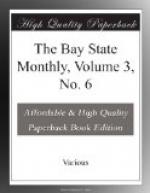These observations are deemed not inappropriate as an introduction to a sketch of the life of one of the most eminent lawyers of New England, whose career may be regarded as signally worthy of imitation.
Henry William paine was born August 30th, 1810, in Winslow, Maine. His father, Lemuel Paine, a native of Foxborough, Mass., was a graduate of Brown University, and a lawyer by profession, who began practice in Winslow, Maine, in partnership with Gen. Ripley, afterwards the hero of Lundy’s Lane. Owing to poor health, Mr. Paine, sen., soon abandoned the law for other pursuits. He was familiar with the representative English authors, and specially fond of the Greek language and literature, which he cultivated during his life. He had a tenacious memory, and could quote Homer by the page. Henry Paine’s mother, Jane Thomson Warren, was the daughter of Ebenezer T. Warren, of Foxborough, the brother of General Joseph Warren, who fell at Bunker Hill. Of the three children of Lemuel and Jane T. (Warren) Paine, Henry William was the second.
After the usual preparatory education, Mr. Paine entered Waterville College (now Colby University) in 1826, and graduated in 1830, at the age of twenty, with the highest honor of his class. During the last year of the college course, he was principal of Waterville Academy, then just founded for the preparation of young men for college. He spent eight hours a day in charge of his pupils, of whom there were eighty-two, and at the same time kept up with his class in the college studies. As a teacher he was greatly beloved and respected by his pupils, whose affection was won by no lack of discipline, but by his kindly sympathy, encouragement, and watchful aid in their studies. He had an eye that could beam with tenderness, or dart lightnings; and it was a fine moral spectacle, illustrating the superiority of mental over physical force, to see a bully of the school, almost twice his size, and who, apparently, could have crushed him if he chose, quail under his eagle gaze, when arraigned at the principal’s desk for a misdemeanor. It is doubtful if ever he flogged a scholar; but he sometimes brought the ruler down upon the desk with a force that made the schoolroom ring, and inspired the lawless with a very wholesome respect for his authority. The fact that from that day to this his office has always been a kind of Mecca, to which his old pupils, whether dwellers in “Araby the Blest” or in the sandy wastes of life, have made pious pilgrimages, shows how deeply he was loved and how highly he was honored as a teacher.




